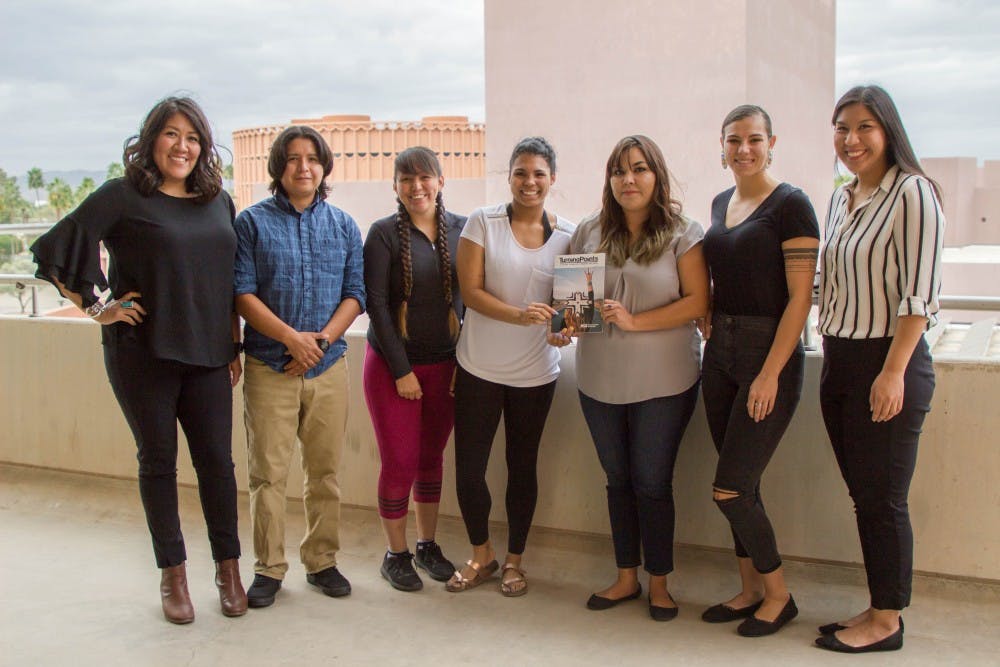After two years of speaking with hundreds of Native American ASU students and administrators, the first issue of Turning Points, the first Native American college magazine, was published last November.
The semiannual magazine, available online and in print, features stories about and by Native students and educates them on resources for the American Indian community.
Taylor Notah, a journalism senior and writer for the publication, said Turning Points aims to address the culture shock of those who come to college from tribal communities.
"Turning Points Magazine is there as a guide to help (Native students) feel like we belong on campus because we do," Notah said. "We're reinforcing to Native students that our voices do matter and that we're here for one another."
Topics covered in the magazine's first issue include Native American experiences and traditions and pieces on fashion, cuisine and wellness.
Notah said the second edition is expected to come out in April and will delve into issues such as depression and suicide as well as celebratory events like graduation.
The publication was mailed to all Native students at ASU and extra copies were sent to tribe leaders and prospective ASU students, she said.
Bryan Brayboy, special advisor to the president on American Indian Affairs at ASU and senior editor of Turning Points, said there are around 2,800 Native Americans enrolled at the University.
The publication's research team determined Turning Points was the first college magazine of its kind after conducting a market analysis and finding no magazine like it, Brayboy said.
"American Indians in educational institutions are facing a sense of being invisible and not always belonging ... (because) they don’t see a lot of each other,” he said.
Brayboy said some misconceptions surrounding Native Americans include thinking that they are primitive or no longer around. Additionally, he said some people don’t know that tribal communities and nations in Arizona are sovereign and own about a third of the land and a third of the water in the state.
Retention and graduation rates for Native students at ASU are increasing every year, Brayboy said. Four-year graduation rates increased to 43 percent from 31 percent eight years ago, and retention rates are at 80 percent, he said.
Brayboy said he credits this improvement to the greater availability of resources for all ASU students.
Ravenna Curley, an industrial design senior and graphic designer for the magazine, said she and another designer started working on the magazine last February.
The group had to contend with costs and a small team when preparing the print product. Additionally, the magazine had to be designed to combine ASU colors and style with Native American culture, Curley said.
"It was a bit hard at the beginning because it was the first magazine that we did, but we're getting more efficient and inspiring each other,” she said. "What we are doing for our Native students is what is helping us keep going."
Amanda Tachine, a postdoctoral scholar at the Center for Indian Education and senior editor for Turning Points, said the staff is entirely composed of Native students.
Tachine said that for the past two years, she and Brayboy met with Native students from all of ASU's campuses to determine their concerns, such as feelings of isolation and a lack of awareness of University resources.
After these sessions, they met with staff and administrators who had been working with the Native community at ASU to find a way to disseminate information. Tachine said they decided a magazine would be the best option because of its tangibility.
Aside from the resources outlined in the magazine, Tachine recommended that Native students reach out to their communities and families and non-Native students learn about American Indians and be more understanding about the issues and challenges they face.
“America is on indigenous land," Tachine said. "It's important for people in America now to know the history of the people who were here before and where we are at now. Learning about Native American experiences is only going to help strengthen your worldview and your understanding of your place in society.”
Reach the reporter at afalero1@asu.edu or follow @afalero18 on Twitter.
Like The State Press on Facebook and follow @statepress on Twitter.




